The Country’s Most Progressive Teachers Union Is On The Ballot In Chicago
- Oops!Something went wrong.Please try again later.
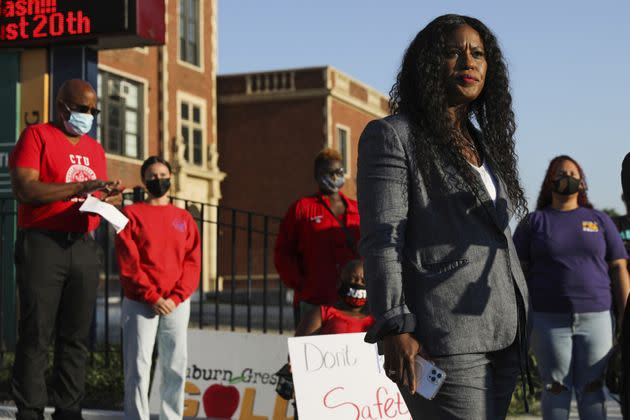
Stacy Davis Gates, president of the Chicago Teachers Union, said that the union's support for Brandon Johnson's mayoral campaign is "about survival."
CHICAGO — If Brandon Johnson, a progressive Cook County commissioner, wins Chicago’s mayoral election on Tuesday, it will be one of the most consequential victories for the United States’ activist left in recent history.
It will also be thanks in significant part to more than a decade of organizing and investment by the Chicago Teachers Union, or CTU.
Johnson, a former schoolteacher turned union organizer and legislative representative, is himself one of the CTU’s nearly 30,000 members. And without the union’s institutional convening power and financial resources, it is hard to imagine Johnson being competitive against the more conservative mayoral hopeful Paul Vallas.
CTU’s influence goes much deeper, however. In conjunction with its allies, the union methodically built the multiracial social movement on top of which Johnson stands.
Now the union is closer than it has ever been to gaining an ally in the Chicago mayor’s office — and delivering a devastating blow to the anti-union school reform movement in the process. Vallas, a former CEO of Chicago Public Schools and longtime critic of CTU, is running on ending what he calls the union’s “stranglehold” on the city’s public school system.
But a union that measures progress in decades is already tempering expectations about what that will mean.
“People will have everyone else believe that if Brandon becomes mayor, that, magically, generations of underfunding, generations of segregation, generations of an equitable application of school funding is suddenly going to be over. That’s not going to happen,” CTU President Stacy Davis Gates told HuffPost in a late March interview at CTU’s Chicago headquarters.
“We’re still going to have our needs, and we’re going to have a partner to figure out how we sequence and scaffold and implement and provide, that’s what we will have,” Gates added. “And that’s the starting point. That’s not the endpoint.”
At the same time, a loss for Johnson would represent a significant setback for CTU that could embolden politicians seeking to curb the union’s power.
“If they lose, this will stop the momentum of the CTU having outsize influence in Chicago politics,” said Pat Brady, a Vallas supporter and former chair of the Illinois Republican Party, who has a lobbying and media consulting practice in Chicago. “If it doesn’t stop it, it slows it tremendously.”
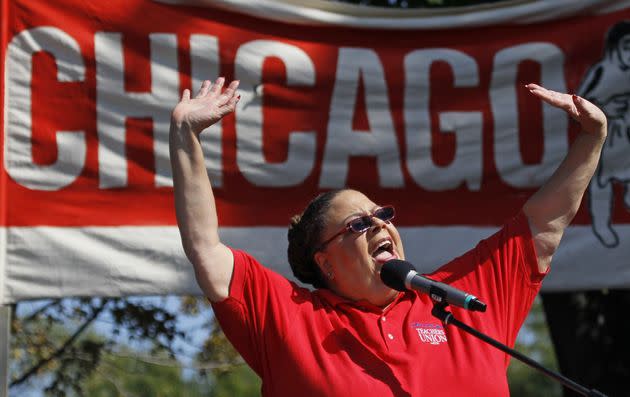
The late Karen Lewis, then president of CTU, addresses supporters during a teachers strike in September 2012. Lewis began the process of transforming the union into a political powerhouse.
From A Union To A Movement
The slow-moving political earthquake that has brought Johnson to the brink of citywide power began in earnest in June 2010. That’s when the late Karen Lewis, a high school chemistry teacher affiliated with the progressive Caucus of Rank-and-File Educators, or CORE, won her election as president of the union, ousting a leader that had been more accommodating to the Chicago mayor’s office.
After more than a decade in which the city had ramped up the use of standardized testing to assess school performance, allowed non-union charter schools to proliferate and shuttered dozens of unionized community public schools, Lewis vowed to go on the offensive against a Chicago mayor’s office that had been exercising direct control over the public school system since 1995.
In 2012, under Lewis’s leadership, CTU went on strike for the first time since 1987, demanding higher pay and less reliance on standardized testing in teacher and school assessments, but also more funding for art, music, wrap-around social services and smaller classrooms. Brandishing the slogan “The Schools Students Deserve,” the CTU won the support of plenty of parents, some of whom memorably joined the union on the picket line.
The nine-day strike secured CTU some pay increases ― and turned Lewis and the union into nationalprogressive stars.
“Karen’s coming in and she’s trying to impress upon people that you can survive this onslaught of ‘education deform,’ as she called it,” recalled Gates, a history teacher who joined the union staff as political director in 2011. “And the 2012 strike is emblematic of them saying, ‘Yes, we can.’”
But the 2012 deal that ended the strike also included painful concessions for CTU, such as an increase in the extent to which the assessment of teachers’ performances would be based on their students’ standardized test scores.
We don’t get here without every election between 2013 and 2023.Stacy Davis Gates, president, Chicago Teachers Union
The following year, then-Mayor Rahm Emanuel pushed ahead with his agenda to shutter schools where enrollment had declined and a high percentage of students were failing to meet his performance metrics. He ultimately closed 49 schools — the largest mass closure in city history.
The shuttered schools were concentrated in predominantly Black neighborhoods on Chicago’s South and West sides. Many people in those communities lamented that students at those schools would have to be bused across town to schools in unfamiliar communities where rival gangs posed a risk to their physical safety.
“That’s one thing they weren’t understanding before,” said Rev. Shun Fox, a minister in the West Side’s Austin neighborhood, where Johnson lives. “The city of Chicago is so sectioned off.”
The school closures “didn’t resonate well with Chicago,” he added.
Lewis concluded from the experience that, absent a more meaningful role in city politics, the union’s membership — and the traditional public school system itself — would continue to suffer a slow decline.
Gates remembers Lewis effectively saying, “We’re under mayoral control, this guy is our boss — let’s take our grievances directly to the voters.”
The union took a two-pronged approach to the task of increasing its political footprint.
First, it began taking the process of recruiting, endorsing and electing candidates more seriously, with an understanding that even losses at the ballot box would help the union build power.
To that end, CTU founded United Working Families, a political party affiliated with the national Working Families Party that serves as a one-stop shop for the union and its allies’ progressive electioneering.
“We are still a union. We’re not a political party,” Gates said. “But we helped to build one.”
Early victories for CTU and United Working Families included the elections of democratic socialist Carlos Ramirez-Rosa and Susan Sadlowski Garza, a CTU member and official, to the Chicago City Council in 2015. Lewis considered running for mayor that year, but her 2014 cancer diagnosis ruled that out.
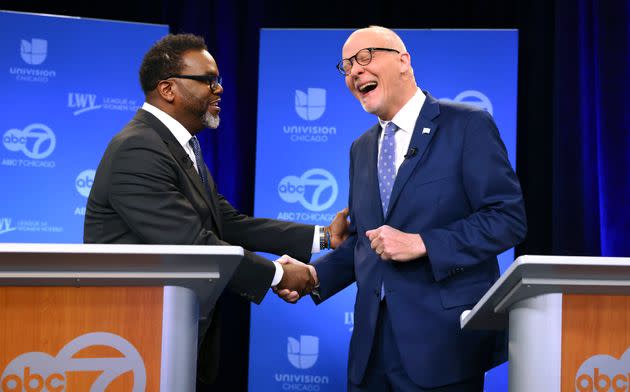
Brandon Johnson, left, and Paul Vallas share a light moment before the start of a televised debate on March 16.
Instead, the union endorsed Jesús “Chuy” García, who is now a congressman. García ultimately lost to Emanuel, but not before forcing him into a runoff election for the first time since runoffs became a possibility in 1999.
By 2018, CTU was helping Johnson win his place on the Cook County Board of Commissioners and Delia Ramirez land her seat in the state House of Representatives. Ramirez, who is now a progressive member of Congress, introduced the state-level legislation that is set to shift Chicago from a school district under direct mayoral control to one governed by a 21-member elected school board. The board, long sought by CTU, would be the largest school board in the country.
And this year, seven of the Chicago City Council candidates whom CTU endorsed have already won their races. Another five CTU-backed candidates are competing in runoff elections on Tuesday.
“We don’t get here without every election between 2013 and 2023,” Gates told HuffPost. “That’s why every election is important.”
Under Gates’ leadership ― first as political director and now president ― CTU also doubled down on a comprehensive progressive policy agenda. That agenda is based on a belief that poverty, segregation and government neglect, rather than teacher quality, are to blame for underprivileged students’ difficulties in school.
The union has accordingly taken strong stances in support of building more affordable housing in the city, imposing higher taxes on the rich and ending police abuses. On the latter front, the union even got behind an effort to expel police officers from city public schools.
There is no focusing on the classroom if you don’t focus on the social issues that are impacting the students in the classroom.U.S. Rep. Delia Ramirez (D-Ill.)
“People say, well, ‘Why are the teachers obsessed about affordable housing or addressing homelessness, or clinical social workers issues? Just focus on the classroom,’” Ramirez told HuffPost while campaigning for Johnson and two city council candidates in the Belmont Cragin neighborhood. “There is no focusing on the classroom if you don’t focus on the social issues that are impacting the students in the classroom.”
The union has continued to suffer setbacks on the road to greater influence. In 2019, the union endorsed Toni Preckwinkle, president of the Cook County Commission, for Chicago mayor. Preckwinkle lost to Lori Lightfoot, the current mayor, in a landslide.
Soon after, CTU had a chance to flex its muscles against Lightfoot at the bargaining table. When CTU went on strike for 11 days in 2019, the union prevailed on the city to spend hundreds of millions more dollars on reducing class sizes and hiring nurses, social workers and librarians to work in schools that lacked them.
CTU has enlisted allies in these fights, forming a loose coalition of progressive labor unions with local chapters of SEIU and AFSCME, both of which represent a racially diverse group of public-sector and service employees in the city.
Other unions across the country have either rapidly scaled up their political operations in recent years or followed CTU’s lead in making common cause with other unions to pursue a broad, progressive policy agenda. But perhaps no union has done both with as much speed and effectiveness as the CTU, according to Alex Han, a former top official at SEIU Healthcare Illinois & Indiana and co-founder of United Working Families.
“For combining that progressive vision with deep community ties and political power, there is no parallel,” said Han, who is now executive director of the nonprofit left-wing news outlet In These Times.
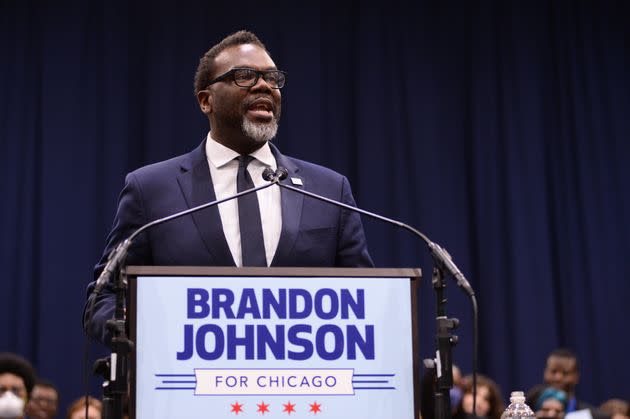
Brandon Johnson speaks at a campaign rally on March 30. His critics worry that he is too close to the Chicago Teachers Union to govern independently.
Fears Of A Union Takeover
The strength of the coalition that CTU has assembled is evident in the fact that 90% of Johnson’s $11 million campaign haul has come from unions.
Not every member of CTU is happy about the amount that their union is spending to support Johnson. Specifically, a group of members has filed an unfair labor practice complaint against union leadership for approving the bundling of $8 from each member’s dues to transfer as much as $2 million to Johnson’s campaign. The members allege that the union violated a part of its bylaws requiring greater member input on political spending.
Gates maintains that what CTU did is a standard practice among unions in state and city politics. She argued that the scrutiny she’s facing from within the union reflects a sexist double standard.
“It is difficult for people to grab hold of the idea that a group of women can figure out how to do it just like the boys do,” she said.
A union president in another state confirmed to HuffPost that bundling from dues for political donations is common in state and local elections where it is permitted, even though federal law prohibits the practice in federal elections. (In federal elections, unions can voluntarily seek donations from members and allocate them to a separate political action committee.)
Then, there are the fears that Johnson, if elected, would be too beholden to CTU. The union’s current five-year contract is set to expire at the end of 2024, setting the stage for contentious negotiations with the city sometime in the next year and a half. Those talks will take place at a time when federal COVID-19 relief money will have largely dried up, straining the city’s finances.
“How do you like negotiating when both sides of the argument are the teachers union? You’re negotiating with yourself,” outgoing Alderman Tom Tunney, a moderate backing Vallas, told HuffPost. “Where’s the check and balance on this thing?”
The unions are concerned about themselves.Rev. Corey Brooks
Tunney also suggested that, in keeping with CTU’s skepticism toward selective-enrollment or “magnet” schools, Johnson would do away with those more elite schools’ application processes. That could, in turn, prompt more educated and affluent parents like those in Tunney’s northern lakefront ward to either leave the city or turn to private schools, Tunney warned.
Johnson, who is still receiving a salary from CTU alongside the pay he receives for his post on the Cook County commission, has repeatedly emphasized that, if elected, he will end his membership in CTU and govern independently. In a March 8 debate with Vallas, Johnson promised to serve as a mayor “for everyone” and that his “fiduciary responsibility” to the city would take precedence over his ties to the union.
At an impromptu press conference at the City Club of Chicago on March 27, however, Johnson struggled to articulate his position on selective-enrollment public schools.
“We cannot afford to have a stratified school district where you have to apply in order to have access to a quality school,” he said.
Pressed on whether his vision for a less stratified school system would require an outright elimination of selective admissions processes, Johnson did not answer. Shortly after the press conference, his campaign issued a statement clarifying that he would seek to bolster funding for community schools, “not end” selective enrollment.
CTU has grown in prominence at a time when the Democratic Party has shifted to the left more broadly and the kinds of “school choice” reforms favored by Vallas have fallen out of favor.
But the debate among Democrats over how best to improve public schools continues to simmer beneath the surface. Those who remain sympathetic to charter schools and to demanding more from unionized public school teachers tend to argue that the persistence of poverty and other obstacles to educational advancement does not preclude the possibility that better teacher quality and school administration can meaningfully improve students’ lives.
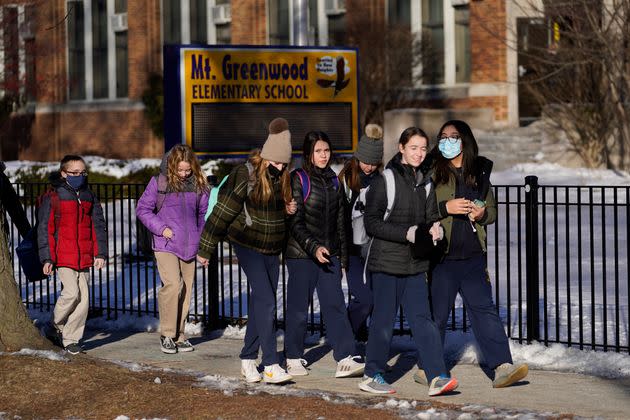
Students at Mt. Greenwood Elementary School in Chicago depart after a full day of classes following the strike in January 2022.
“The unions are concerned about themselves,” said Rev. Corey Brooks, a pastor and anti-violence advocate in the South Side’s Woodlawn neighborhood who is supporting Vallas. “They’re not concerned about students. And they’re definitely not concerned about the Black community.”
Brooks soured on CTU during the COVID-19 pandemic, believing that the union kept schools closed to in-person learning for too long.
Specifically, Brooks and other critics blame the union for approving a last-minute strike in January 2022 to insist on a continuation of remote learning amid the omicron wave. The teachers were demanding stricter health and safety protocols from the city, including more KN95 masks and antigen testing for students, though Lightfoot’s team maintained that they were already offering those things.
The relative frequency with which the union has gone on strike has even bothered Fox, the West side pastor, who is supporting Johnson.
“I think they need better leadership,” he said of the union.
Johnson has stood by the union’s decisions on in-person learning. And Gates blames Lightfoot for what she says was the mayor’s refusal to accommodate reasonable safety demands, including that immunocompromised teachers receive exemptions allowing them to continue teaching at home.
“Look, Lori Lightfoot has been repudiated for her leadership in the city,” said Gates, noting that Lightfoot failed to make Tuesday’s runoff. “And now y’all want to come back and talk to me about her leadership during COVID?!”
Inside CTU headquarters, the union practices what it preaches. Masks are still required inside the building.
The union also maintains that its concerns about in-person learning were consistent with the worries of a majority of public school parents. At least some polling suggested that that was true, as an education policy expert at the libertarian Cato Institute noted during the 2022 strike.
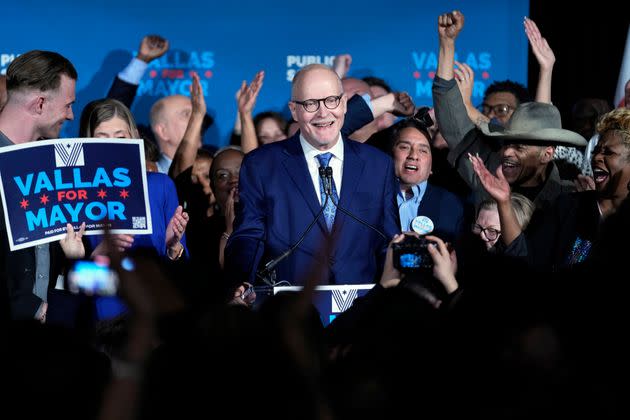
Chicago mayoral candidate Paul Vallas has a history of enacting policies loathed by teachers unions.
‘This Is About Survival’
Regardless, the challenges facing the city’s public school system — and CTU, by extension — are indisputable. The pandemic accelerated a decadeslong decline in school enrollment. Chicago Public Schools enrolled 9,000 fewer students in the current school year than in the previous one. As a result, Miami-Dade County Public Schools in Florida has overtaken Chicago as the country’s third-largest school district.
When I ask Gates if the union has ideas about how to improve enrollment, she harks back to her holistic critique of what she sees as racist economic policies starving the school system and the families that use it. She specifically faults Vallas, who was Chicago budget director in the early 1990s before taking over as schools CEO, and other business-friendly Chicago officials, for allowing the city to become unaffordable for low-income and working-class families.
“If you don’t have kids in the school, it means you don’t have families in the city. Those things go together,” she said. “And if families aren’t in the city, they don’t have anywhere to live that they can afford.”
In Vallas, CTU has an ideological opponent every bit as pure as the ally it has in Johnson.
Vallas, who ran Chicago Public Schools from 1995 to 2001, is keen to note that he did not close down any schools, but his introduction of probation and other disciplinary measures for schools that he deemed inadequate laid the groundwork for his successors’ more aggressive measures.
After Chicago, Vallas went on to run public school systems in Philadelphia, New Orleans and Bridgeport, Connecticut, where he followed a similar formula of consolidating traditional public schools, allowing charter schools to proliferate and increasing the test-based assessment of teacher performance. Vallas drew praise from some local school officials and politicians in those cash-strapped cities for squeezing municipal budgets for savings that could be used to improve school buildings and shutting down mediocre charter schools, even when it angered conservative allies.
The Chicago Teachers Union has had a stranglehold over our schools – an absolute stranglehold over the schools … to the detriment of the kids.Paul Vallas, candidate for Chicago mayor
Now Vallas promises to do the same as mayor of Chicago.
“We’ve got to open our [school] buildings, in the dinner hour, on weekends, over the summer and over the holidays, and we’ve got to bring faith-based and community-based organizations to the schools,” Vallas said at a March 27 press conference with leaders of more conservative labor unions that support him. “The Chicago Teachers Union has had a stranglehold over our schools — an absolute stranglehold over the schools … to the detriment of the kids.”
But in the cities where he served as a schools turnaround specialist, Vallas also elicited loud opposition from unions and other local stakeholders, who blame him for making a mess of the budget and then leaving before the political blowback could force him out. Those detractors include Democratic U.S. Reps. Troy Carter of New Orleans and Brendan Boyle of Philadelphia — both mainstream liberals who appeared in a Johnson campaign digital ad titled “Trail of Destruction” that blasted Vallas.
Asked whether investing so much in Johnson’s mayoral bid did not carry significant risk, Gates responded that the union had no alternative, given the dangers of Vallas’ potential mayoralty.
“This is about survival,” she said.
If Vallas wins, some of CTU’s earlier wins could limit his influence over city schools. For example, in the next few years, the management of Chicago Public Schools will shift out of direct mayoral control to an elected school board. But as part of the transition to a completely elected board, the next mayor will still have the power to appoint 11 of the 21 school board members in 2024.
What’s more, the Chicago City Council, which is almost certain to be friendlier to CTU than Vallas would be if he wins, recently voted to expand its power vis-a-vis the next mayor.
Still, I wanted to know what Gates planned to do if Johnson “falls short.”
She cut me off.
“He wouldn’t fall short,” she said. “The movement would fall short.”
